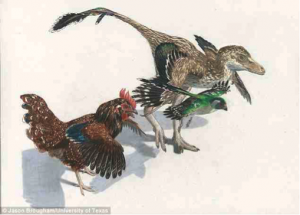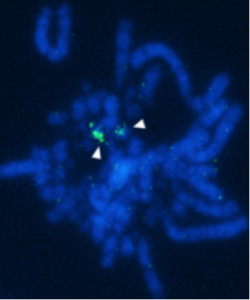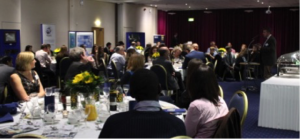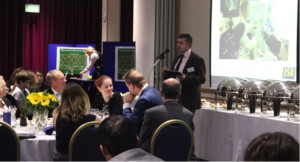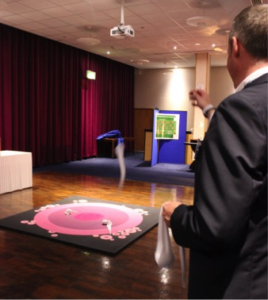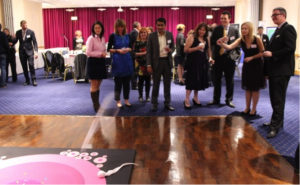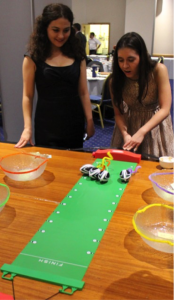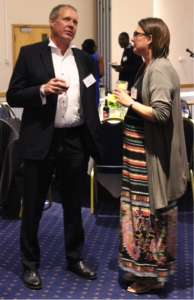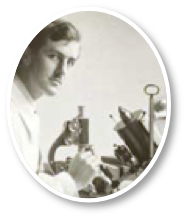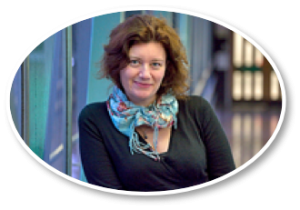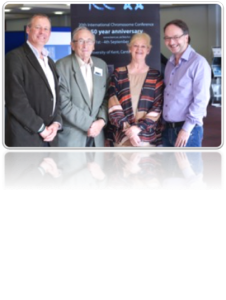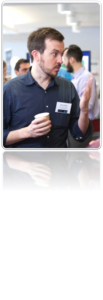‘Hey, teacher, leave those parents alone!’
In October, the English Government’s Social Mobility and Child Poverty Commission published a report that proposed a national programme of parenting classes, claiming that four in ten parents are doing an inadequate job raising their children. These comments responded to the Report:Reader in Social Policy at the University of Kent Dr. Ellie Lee comments: ‘Hey, teacher, leave those parents alone!’
Kent reproductive law expert cautions against use of ‘three-parent’ terminology
29th January 2015
Kent reproductive law expert Dr Kirsty Horsey welcomes a parliamentary vote on legalising mitochondrial donation techniques but cautions against use of ‘three parent’ terminology.
Commenting in response to the article, ‘Legalise three-parent babies, say Nobel winners‘ in The Times today, Dr Horsey said: ‘The Parliamentary vote on regulations to allow mitochondrial donation, potentially making the UK the world’s first country to legalise this life-changing treatment, is excellent news for carriers of mitochondrial diseases, who previously have had to leave their children’s health to chance, and cope with extreme sickness and even death of their children.
‘This is a progressive step in both science and should it happen law. Other embryo screening techniques are already used in IVF to allow some parents to give birth to healthy children free from certain serious conditions. We also allow people to use sperm or egg donors, or surrogates, for the same reason, among others.
‘We should note that this process has been thoroughly ethically reviewed, and steer clear of the ‘three parents’ or ‘three mothers’ label, remembering that this is a technique that allows women the chance to bring a healthy child into the world.’
Dr Horsey, a Senior Law Lecturer at Kent Law School, has research expertise in the regulation of human reproduction and genetic technologies. She has recently secured funding to investigate surrogacy law in practice.
Dr Horsey’s latest book, Revisiting the Regulation of Human Fertilisation and Embryology, is due for publication by Routledge in June.
Kent | Ghent Bioethics Collaborative Initiative Event Agenda
Kent | Ghent Bioethics Collaborative Initiative 24-26 February 2015
Kent Law School | Bioethics Institute Ghent | Centre for Interdisciplinary Studies of Reproduction (CISoR) University of Kent
Tuesday 24.02.15
VESSEL: Film Viewing and Discussion
Eliot Lecture Theatre ELT2 18.00 – 20.00
Co-hosts: CISoR, KCLGS & CeCIL
Moderator: Sally Sheldon
VESSEL begins with a young doctor who lived by the sea, and an unlikely idea. Rebecca Gomperts, horrified by the realities created by anti-abortion law around the world, felt compelled to challenge this. Her method: to provide abortions on a ship in offshore waters.
We witness the creation of an underground network of emboldened, informed activists, working at the cutting edge of global reproductive rights, who trust women to handle abortion themselves. VESSEL is Rebecca’s story: one of a woman who heard and answered a calling, and transformed a wildly improbable idea into a global movement.
Wednesday 25.02.15
Confronting Science, Law & Bioethics: Areas of Current Research I
Keynes KLT5
| 13.30 | Pamela White Introduction: Kent|Ghent |
| 13.40 | Ellie Lee ‘After the “need for…a father”: “The welfare of the child” and “supportive parenting” in UK assisted conception clinics’ |
| 14.10 | Guido Pennings ‘The welfare of the child after social freezing of oocytes’ |
| 14.40 | Sally Sheldon ‘The regulatory cliff edge between contraception and abortion: The legal and moral significance of implantation’ |
| 15.10 | Health Break |
| 15.40 | Veerle Provoost ‘What constitutes parenthood according to (aspiring) parents, knowing that one partner will not be/is not genetically related to their child?’ |
| 16.10 | Robbie Sutton ‘The precious vessel hypothesis: ubiquity & implications of “benevolent sexism” for interventions on conception, pregnancy and childbirth’ |
| 16.40 | Pamela White ‘Hidden data/hidden activities: What Canada’s ART Registry (CARTR) reveals about gestational carriers’ |
| 17.10 | Darren Griffin ‘25 years of PGD’ |
| 17:40 | CISoR Light Refreshments |
| 18:30 | Close |
Thursday 26.02.15
Confronting Science, Law and Bioethics: Areas of Current Research II
Keynes KLT5
| 10.30 | Book Panel Kirsty Horsey: Revisiting the Regulation of Human Fertilisation and EmbryologyKirsty Horsey, Antony Blackburn-Starza, Katia Neofytou, Karen Devine, Pamela White |
Working Lunch
Brian Simpson Room KLS Eliot Extension
| 12.00 | Robin Mackenzie, Veerle Provoost, PG/LLM student representativesCollaborative opportunities for KLS | Ghent |CISoR
· Student Research/Research areas of interest · Research funding opportunities, joint ventures · Student/teaching joint collaborations · Planning for Kent/Ghent visit in April, 2015 · Focus on Death and Dying, Genetic Testing… · Summary and Conclusion |
| 14:00 | Close |
New research suggests that chickens experienced fewer gross genomic changes than other birds as they evolved from their dinosaur ancestor
CISoR director Professor Darren Griffin appeared on BBC radio 4 Today programme (as well as the BBC World Service), talking about his work on avian genomes and how change in them can lead to reproductive isolation. In the most recent work, Professor Griffin described his laboratory’s research on chromosomal change and how, of the genomes they have analysed, the chicken and turkey most closely resembles the dinosaur ancestor of birds.
Published in the journal BMC genomics the paper was led by Michael Romanov in collaboration with Drs Denis Larkin and Marta Farre of the Royal Veterinary College
The Kent research is part of a study by a consortium of leading scientists into avian or bird genomes, which tell a story of species evolution published in the December issue of the popular journal Science. The living descendants of dinosaurs were thought to have undergone a rapid burst of evolution after most dinosaur species were wiped out. The detailed family tree of modern birds has however confused biologists for centuries and the molecular details of how birds arrived at the spectacular biodiversity of more than 10,000 species is barely known.
Professor Griffin explained that bird genomes are distinctive in that they have more tiny microchromosomes than any other vertebrate group. These small packages of gene-rich material are thought to have been present in their dinosaur ancestors. The team found that the chicken has the most similar overall chromosome pattern to its avian dinosaur ancestor. The researchers also found that the fastest rate of change had occurred in the zebra finch and budgerigar, consistent with more rapid speciation events in songbirds and their relatives.
Professor Griffin pointed out, to around 5 million listeners, that features such as birdsong evolved largely as reproductive strategies to find a mate.
DNA hybridization experiment under a fluorescence microscope showing the relationship between a section of ostrich and chicken genomes.
In November of 2014, immediately following Approval by the University of Kent Senate, the Centre for interdisciplinary Studies of Reproduction (CISoR) has its opening event. A starter of chicken liver pate or roasted pepper salad was followed by a welcome by Philippe De Wilde, Pro-Vice-Chancellor for Research. Professors Darren Griffin (School of Biosciences) and Sally Sheldon (Kent Law School) Director and Deputy Director of CISoR welcomed the guests and shared their thoughts on reproduction and the significance of interdisciplinary study. Guest were then treated to a dinner of glazed salmon fillet or vegetable Jalfrezi after which Drs Grant Walling (JSR Genetics) and Alan Thornhill (Illumina Inc) shared their thoughts on reproduction and feeding a growing population as well as the role of CISoR from numerous vantage points. The evening was then given over to a series of fun activities including:
- When you realized you were pregnant (an adapted game of roulette)
- Fertilize your egg (a game of archery)
- Guess the weight of the baby (or at least a reasonable facsimile)
- Sperm racing (like horse racing but with a twist)
….…. before being treated to dessert. The members of CISoR are extremely grateful to the BBSRC, Illumina Inc, JSR Genetics, Andrology Solutions, Research Instruments, The Bridge IVF Centre and Fairweather’s Solicitors for sponsoring the event and providing the raffle prizes.
“Three parent IVF” was discussed throughout the meeting
Dr Alan Thornhill was uniquely placed to speak on the various roles of CISoR after having been employed in academia (he is also an honorary Reader with the University), in private and NHS IVF clinics (including the Bridge Centre and Guys’ Hospital) and most recently with Illumina Inc.
The fertilization game
Sperm racing
Having children was likened to a game of Roulette
Science, Law and Bioethics: Kent/Ghent Bioethics Collaborative Initiative, February 24-26, 2015
Science, Law and Bioethics: Kent/Ghent Bioethics Collaborative Initiative,
February 24-26, 2015
Organised by Kent Law School (KLS), Bioethics Institute Ghent (BIG), and the University of Kent, Centre for Interdisciplinary Studies of Reproduction (CISoR)
All are welcome to come along to the discussions take place. All the events are being held on Kent University’s Canterbury Campus.
For more information contact Dr. Pamela White P.White-229@kent.ac.uk
Tuesday 24 February 6:00 – 8:00 pm, ELT2
VESSEL —-Film Viewing and Discussion, co-hosted by CiSoR, KCLGS and CeCIL, and moderated by Professor Sally Sheldon
VESSEL begins with a young doctor who lived by the sea, and an unlikely idea. Rebecca Gomperts, horrified by the realities created by anti-abortion law around the world, felt compelled to challenge this. Her method: to provide abortions on a ship in offshore waters.We witness the creation of an underground network of emboldened, informed activists, working at the cutting edge of global reproductive rights, who trust women to handle abortion themselves. VESSEL is Rebecca’s story: one of a woman who heard and answered a calling, and transformed a wildly improbable idea into a global movement.
Wednesday 25 February Keynes College Lecture Theatre 5, 1.30pm -5.30pm
Confronting Science, Law and Bioethics
A series of papers will be given.
‘What constitutes parenthood according to (aspiring) parents, knowing that one partner will not be/is not genetically related to their child?’ (Dr Veerle Provoost)
‘After the ‘need for….a father’: ‘The welfare of the child’ and ‘supportive parenting’ in UK assisted conception clinics’ (Prof. Ellie Lee)
‘The welfare of the child after social freezing of oocytes’ (Prof. Guido Pennings)
‘The regulatory cliff edge between contraception and abortion: the legal and moral significance of implantation’. (Prof. Sally Sheldon)
‘What constitutes parenthood according to (aspiring) parents, knowing that one partner will not be/is not genetically related to their child?’ (Dr Veerle Provoost)
‘The precious vessel hypothesis: Ubiquity and implications of ‘Benevolent Sexism’ for interventions on conception, pregnancy and childbirth.’ (Prof. Robbie Sutton)
‘Hidden Data?: What Canada’s ART Registry (CARTR) Reveals about Gestational Carriers’ (Dr Pamela White)
‘25 years of PGD’ (Prof. Darren Griffin)
Refreshments, Keynes College Lecture Theatre 5, 5.30pm – 6.30pm
Thursday, 26 February Keynes College Lecture Theatre 5, 10:30-12:00
Confronting Science, Law and Bioethics: Kent/Ghent Bioethics Collaborative Initiative
‘Revisiting the Regulation of Human Fertilisation and Embryology’. A Roundtable discussion Chaired by Dr Kirsty Horsey with presentations (Prof. K. Devine, A. Blackburn-Starza, K. Neofytou, Dr. P. White)
Starting the Discussion: What would we be looking for in a collaborative Kent/Ghent Bioethics arrangement? Comments from Kent KLS PG students with discussion from attendees. (PG Kent Student representative, Prof. V. Provoost)
Thursday, 26 February, Brian Simpson Room, Eliot Extension, 12:00 to 2:00
Starting the Discussion: What would we be looking for in a collaborative Kent/Ghent Bioethics arrangement? Comments from Kent MSc Repromed students with discussion from attendees
Continuing the Discussion: Planning for a visit to Ghent, April 2015
This event has been made possible by the Kent/Ghent Collaborative Research Grant obtained by Professors Sally Sheldon and Robin Mackenzie and Dr. Pamela White, Kent Law School and Professors Veerle Provoost and Guido Pennings, Bioethics Institute Ghent, in association with support provided by Kent’s Centre for Interdisciplinary Studies of Reproduction (CISoR) and Professor Darren Griffin.
A new art exhibition in Canterbury organized by two University academics put the spotlight on the hidden side of science – and revealed the role of a ‘lucky rabbit’ as an unlikely source of inspiration in one laboratory.Entitled “Chain Reaction!”, the exhibition marked the 30th anniversary of the development for laboratory use of the Polymerase Chain Reaction (PCR) procedure. PCR multiplies fragments of DNA, and has ensured advances in genetic science such as forensic analysis and diagnostic tests in IVF embryos and prenatal samples. Charlotte Sleigh and Dr Dan Lloyd worked together to organize the exhibition that ran from 22 November-21 December 2013 at the city’s Sidney Cooper Gallery. A pervading theme of the exhibition, through the work of six artists, was that science through the ages should not be seen as big breakthrough moments, but rather as a series of unsung processes.
Charlotte said: “Science is not all about fancy ideas or extraordinary outcomes. Simple and basic graft is the biggest part of it. This is a show not about the products, but about the processes of science and the people involved.”
“Sometimes PCR simply doesn’t work and the scientists themselves don’t know why. Dealing with this can introduce an element of irrational ritual into what they do; I know of one laboratory where the scientists ‘believe’ that each time they see a rabbit in the woods the PCR will work.”
Two of the artworks on display in the exhibition, Stig Evans’ painting Ritual and his prayer kneelers embroidered with DNA, playfully respond to this rarely discussed aspect of science As well as Stig Evans, among the other artists exhibiting are Annie Halliday, whose work Sum of the Parts explores the key concepts of doubling and copying implicit in the PCR process, and Tony Stallard, whose work Mutation explores the nature of mutation, both in genetics and as a random variable.Dan said: “The process of artists working with scientists has revealed true insights into how science works. It has been fascinating to see how artists and scientists alike have explored PCR and communicated its significance in this exhibition. In doing so, they have learned so much about each other’s practice – as well as their own.”
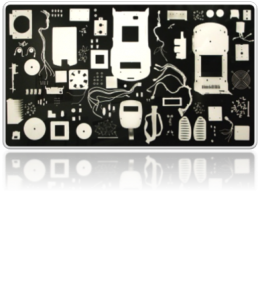
Kentish Chromosomes
It was “no rest for the wicked” as far as conference organization in the Griffin Lab was concerned as Darren and his team organized their second international conference of the year. In the first week of September 2014, Woolf College was home to the 50th Anniversary meeting of the International Chromosome Conference – the 20th of these to be held.
Professor Cyril Darlington, dubbed “the man who invented the chromosome”, first initiated the series back in 1964. Darlington started his academic career in Kent (at Wye College 1920-1923), and in 1953 became Professor of Botany at the University of Oxford. He remained in Oxford until his death in 1981, and during this time, was apparently the next door neighbour of our very own Professor Mick Tuite. Darlington was one of the leading biological thinkers of the twentieth century who sought to answer nature’s biggest questions such as how species arise and how variation occurs. This inspired him to ask questions about the link between biology, culture and society, core themes of CISoR. The national archives in the Bodlean library records his review of “The Archbishop of Canterbury’s memorandum on artificial insemination by donor” as well as his founding of these conferences, something he considered to be one of his most important achievements.
Professor Cyril Darlington
The latest gathering brought together leading researchers on chromosome biology covering topics such as reproduction, fertility, cancer, nuclear organisation, human artificial chromosomes, avian genomics and sex chromosome evolution.
Dr Turi King of the University of Leicester delivered the keynote lecture giving an account of Grey Friars project that uncovered the remains of Richard III. It was thought that the chances of finding Richard’s remains were slim and best but nevertheless, Turi, with her background both in archaeology and genetics, was approached – should the skeletal remains of a ‘good candidate’ to be Richard III be found. Turi spoke about the project, from the early stages of planning, through to the excavation and the results of the various strands of analysis carried out on the skeleton. She told a captivated audience about us about her work on the mitochondrial DNA of two descendants of Richard’s eldest sister, Anne of York, and how this confirmed that the remains were actually the former King himself.
Dr Turi King
The conference began with a reunion of the Griffin lab, which celebrated 10 years in Kent and concluded with a conference dinner at Leeds castle. Darren said “it was a very emotional experience for me to bring together friends, colleagues and former mentors on this historic occasion. The conferencing office, particularly Louisa Harvey did a fantastic job keeping us all organised, and, for the second time in a year, my lab excelled themselves in providing a great advert for the University.”
Professor Darren Griffin, Professor Malcolm Ferguson-Smith, Professor Jenny Graves and Professor Dean Jackson
Wain Medal Lecture on Sex Chromosomes
In October of this year we were delighted to welcome Dr James Turner of the National Institute of Medical Research, as the recipient of this year’s Wain medal. As a result of a generous endowment from the family of the late Professor Louis Wain CBE, FRS, the University of Kent has established an annual Medal Lecture and Award in his memory. The Wain Medal is awarded to a young scientist doing research in biochemistry. Candidates for the award must be 40 years of age or under in the year of the award and work in the United Kingdom. This year James told a captivated audience about how the sex chromosomes appeared in our ancestors, how sex chromosome research is presented in the popular media and how research into them is creating potential new disease treatments.
Dr James Turner
